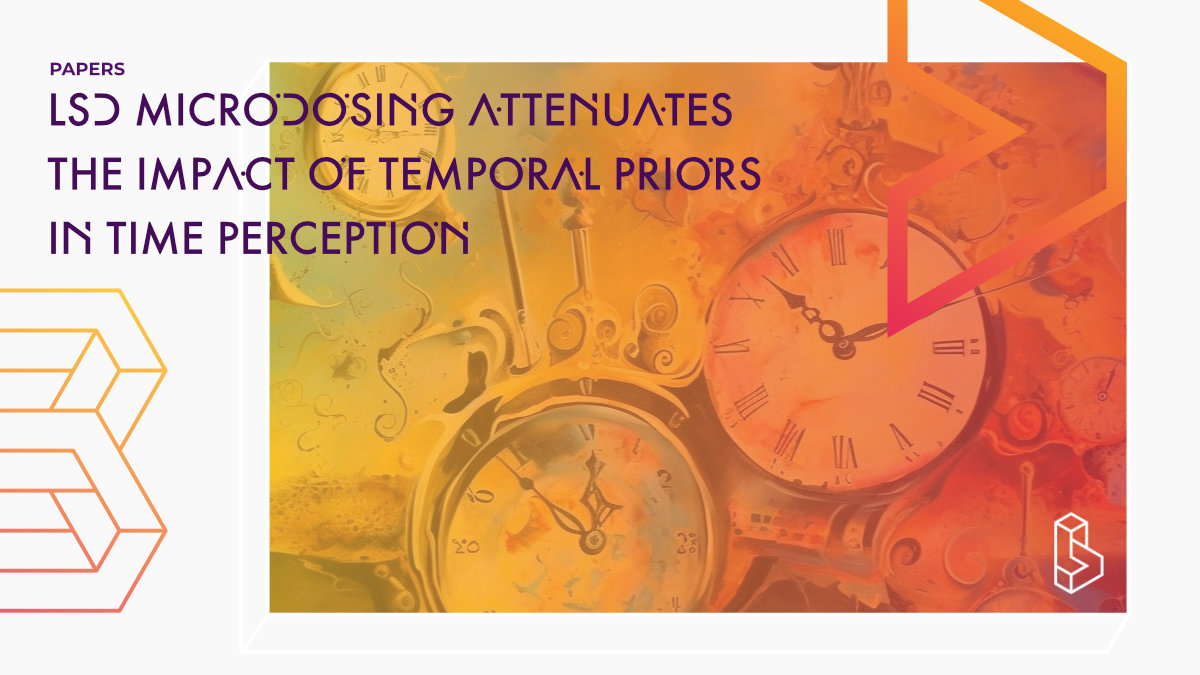This pre-print re-analysis (n=48) of microdosing LSD (5-20μg) finds that LSD reduces the influence of our expectations (precision-weighted local priors) on what we think time should feel like (under-reproduction bias). When controlling for the expectations, the bias disappears, indicating that LSD microdosing reduces the relative weighting of priors (expectations).
Abstract of LSD microdosing attenuates the impact of temporal priors in time perception
“Recent theoretical work embedded within the predictive processing framework has proposed that the neurocognitive and therapeutic effects of psychedelics are driven by the modulation of priors (Carhart-Harris & Friston, 2019). We conducted pre-registered re-analyses of previous research (Yanakieva et al., 2019) to examine whether microdoses of lysergic acid diethylamide (LSD) alleviate the temporal reproduction bias introduced by priors, as predicted by this theoretical framework. In a between-groups design, participants were randomly assigned to one of four groups receiving LSD (5, 10, or 20 μg) or placebo (0 μg) and completed a visual temporal reproduction task spanning subsecond to suprasecond intervals (0.8 to 4 sec). Using mixed-effects modelling, we evaluated the impact of the treatment group, and of the overall history of stimulus intervals (global priors) and the local stimulus history (local priors), weighted by their respective precision weights (inverse of variance), on temporal reproduction. Our principal finding was that the precision-weighted local priors and their precision weights reduced the under-reproduction bias observed under LSD in the original research. Furthermore, controlling for the precision-weighted local prior eliminated the reduced temporal reproduction bias under LSD, indicating that LSD microdosing mitigated the temporal under-reproduction by reducing the relative weighting of priors. These results suggest that LSD microdosing alters human time perception by decreasing the influence of local temporal priors.”
Authors: Renata Sadibolova, Clare Murray-Lawson, Neiloufar Family, Luke T. J. Williams, David P. Luke & Devin B. Terhune
Summary of LSD microdosing attenuates the impact of temporal priors in time perception
The REBUS model proposes that psychedelics relax the weights on expectations based on prior experiences, which can lead to higher thresholds for susceptibility to illusions and less perceptual bias. Here the authors investigated whether LSD’s influence on temporal priors may moderate the bias in temporal reproduction.
They find that LSD reduced the influence of priors and increased confidence in bottom-up information, with potential therapeutic benefits for psychiatric disorders hypothesized to be characterized by pathologically over-weighted priors.
Psychoactive drugs have been shown to modulate time perception, including under-reproduction bias. However, whether this effect is due to the influence of temporal priors mitigated in the LSD group was not assessed. Research has shown that interval timing performance can be modelled as a form of Bayesian inference, and that the impact of psychedelics on temporal priors can be scrutinized through the analysis of statistical patterns.
Find this paper
LSD microdosing attenuates the impact of temporal priors in time perception
https://doi.org/10.1101/2023.04.14.536983
Open Access | Google Scholar | Backup | 🕊
Cite this paper (APA)
Sadibolova, R., Murray-Lawson, C., Family, N., Williams, L. T., Luke, D. P., & Terhune, D. B. (2023). LSD microdosing attenuates the impact of temporal priors in time perception. BioRxiv, 2023-04.
Study details
Compounds studied
LSD
Topics studied
Microdosing
Study characteristics
Original Re-analysis
Placebo-Controlled
Double-Blind
Randomized
Participants
48
Humans
Authors
Authors associated with this publication with profiles on Blossom
Neiloufar FamilyNeiloufar Family is the Director of Research at Eleusis, with specific oversight over the firm's development of psychiatric therapeutics. She has overseen the planning, conduct, and analysis of two Phase 1 clinical trials investigating the therapeutic potential of LSD.
David Luke
David Luke is Senior Lecturer in Psychology at the University of Greenwich, where he has been teaching an undergraduate course on the Psychology of Exceptional Human Experience since 2009, and also Honorary Senior Lecturer at the Centre for Psychedelic Research, Imperial College. His research focuses on transpersonal experiences, anomalous phenomena, and altered states of consciousness, especially via psychedelics, having published more than 100 academic papers in this area, including ten books.
Institutes
Institutes associated with this publication
King's College LondonThe Institute of Psychiatry, Psychology & Neuroscience (IoPPN) at King's College London is one of Europe's top centres for mental health and related neurosciences research.
Eleusis
Eleusis is a clinical-stage life sciences company that studies and develops psychedelic drugs for therapeutic use. Since 2013 the company has been researching psychedelics and is now developing ELE-Psilo (psilocybin) for depression that is in Phase I.
Compound Details
The psychedelics given at which dose and how many times
LSD 5 - 20μg | 1x
Linked Research Papers
Notable research papers that build on or are influenced by this paper
The effects of microdose LSD on time perception: a randomised, double-blind, placebo-controlled trialThis was the first double-blind and placebo-controlled study (n=48) into the effects of microdosing LSD. The topic was quite specific (time perception), but they also reported on other cognitive changes (of which there were few and at a very small scale).

